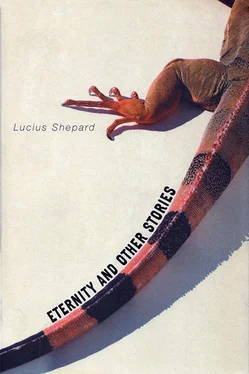Люциус Шепард - Eternity and Other Stories
Здесь есть возможность читать онлайн «Люциус Шепард - Eternity and Other Stories» весь текст электронной книги совершенно бесплатно (целиком полную версию без сокращений). В некоторых случаях можно слушать аудио, скачать через торрент в формате fb2 и присутствует краткое содержание. Город: New York, Год выпуска: 2005, ISBN: 2005, Издательство: Thunder's Mouth Press, Жанр: Фантастика и фэнтези, prose_magic, на английском языке. Описание произведения, (предисловие) а так же отзывы посетителей доступны на портале библиотеки ЛибКат.
- Название:Eternity and Other Stories
- Автор:
- Издательство:Thunder's Mouth Press
- Жанр:
- Год:2005
- Город:New York
- ISBN:978-1-560-25662-5
- Рейтинг книги:5 / 5. Голосов: 1
-
Избранное:Добавить в избранное
- Отзывы:
-
Ваша оценка:
- 100
- 1
- 2
- 3
- 4
- 5
Eternity and Other Stories: краткое содержание, описание и аннотация
Предлагаем к чтению аннотацию, описание, краткое содержание или предисловие (зависит от того, что написал сам автор книги «Eternity and Other Stories»). Если вы не нашли необходимую информацию о книге — напишите в комментариях, мы постараемся отыскать её.
“Lucius Shepard’s stories a jungles — densely alive, sometimes mysterious, often gorgeous, and always dangerous.” — Katerine Dunn, author of Geek Love
Eternity and Other Stories — читать онлайн бесплатно полную книгу (весь текст) целиком
Ниже представлен текст книги, разбитый по страницам. Система сохранения места последней прочитанной страницы, позволяет с удобством читать онлайн бесплатно книгу «Eternity and Other Stories», без необходимости каждый раз заново искать на чём Вы остановились. Поставьте закладку, и сможете в любой момент перейти на страницу, на которой закончили чтение.
Интервал:
Закладка:
“Those fucking wolves are out there,” GRob says, “they’re dead for real, not just their transmitter’s down. I say we keep on going.”
“Deeper into the cave or out into the valley?” Wilson asks this of Baxter, but it’s GRob who answers. “Deeper,” she says. “Might be worse back in there, but I done enough with those wolves.”
“It doesn’t matter one way or the other,” Baxter says, slurring his words.
The anger and frustration that’ve been building in Wilson, his sense of being abandoned by Baxter, betrayed by him, all this spikes, but he doesn’t act on it, he doesn’t start ranking on his best friend, and from this he realizes that, like GRob, he has given up on Baxter. Their stroll in the brass forest has confirmed her judgment. “Dog!” he says to Baxter. “You in there? You are, you better do something, man. Battle juice, God’n Country, IQ. Whatever it takes. ’Cause you are fucking slipping away.”
Baxter’s eyes find him through the faceplate, and he’s about to speak when a silent shadow sweeps over them, a massive shadow. Wilson knows before he glances up that it’s death in some form. Its chill invades him, but it’s gone so quickly, the form that imprints itself on his mind doesn’t seem the one he actually saw, a cat’s face with black wings, leathery wings and struts of cartilage, maybe a bat, an enormous bat. Incredibly fast. Like the blur that took DeNovo. He looks back along the path. Rats are gathering in the crooks of the twisted brass trees that survived their passage, thousands of glinting red eyes pointed from pockets of shadow. He hears behind him the snick of GRob slotting a fresh magazine into her rifle. “Keep going,” she says. “That’s who we are, man. We keep going.”
1655 hours
They are miles from the brass forest, the walls of the cave once again too distant to see or to read, lost in a field of yellow flowers, when they happen upon what appears to be a survivor from another patrol, a suited figure sitting among the flowers, his torso and helmeted head visible above the blooms. At a distance he looks like an element of a Zen garden. A minimalist, vaguely human sculpture of pale brown stone. His privacy screen has been engaged and the display on his faceplate is showing a clip excerpted from a Sylvester and Tweety Bird cartoon. GRob bends to him, punches keys on the soldier’s computer, reads the arm display. “OD,” she says.
“Who is it?” Wilson asks.
“Gary Basknight.”
Wilson remembers him from training. The Basilisk, he called himself. Kept growing a soul patch against regs. Big, muscular kid from Tampa. A laughing skull tattooed on his neck. Wilson, himself tattooless, contemplated getting a similar one. He watches the cartoon clip. Sylvester chases Tweety Bird around a corner inside a house and screeches to a halt when he sees Tweety hovering before him. He makes a two-handed grab for the bird, but Tweety squirts up and Sylvester just misses. He makes another grab, and another. Another yet. Each time, Tweety Bird squirts higher, losing a yellow feather or two in the process, yet suffering no serious damage, continuing to hover almost within reach. Sylvester doesn’t notice that as he grabs and misses, he’s rising higher and higher off the floor. Finally he notices—oh-oh!—and realizes he can’t fly. A perplexed look comes over his face. Then down he falls, leaving a spreadeagled cat-shaped hole in the floor. The clip restarts. Wilson can’t get over the banal ugliness of the sight, this brightly animated few seconds of Oof! and Gasp! and Kapow! framed by a camo-painted combat suit, this human being reduced to a death utterance of streaming video. Nor can he connect these silly, albeit somewhat ominous, images with the surly badass who Basknight pretended to be and, in fact, was. Basknight’s choice of privacy screen might, like his own, have been hastily considered, or maybe this was Basknight’s way of flipping off the world, maybe he realized how obscenely trivial it would appear to anyone finding his body. Then again, maybe the clip embodies an absurdist view of life that he kept hidden from his peers, most of whom perceived him to have the famished appetites and clouded sensibility of a creature in a shooter game.
GRob nudges him and Wilson glances up to see that she’s pointing at Baxter, who has taken a seat among the flowers some twenty yards away. “Baxman?” he says.
“Don’t come near me,” Baxter says. “Come near me, I’ll mess you up.”
GRob puts a hand on Wilson’s arm and says, “Leave him,” but he shakes her off and screams, “Baxter, this is total bullshit!”
“Walk away,” Baxter says.
“That all you got for me? Walk away? After the shit we seen together? That’s it?”
Silence.
“You better talk to me, Baxter!”
“Devil’s loose in the world, man. Where we goin’ go? The devils, they got it all now.”
Fuming, Wilson can’t fit his feelings inside of words.
“War’s over, man,” says Baxter. “I’m shuttin’ it down.”
“Baxter! Goddamn it!”
“I’m with you, man. I hear what you sayin’. But you need to walk away. Right now.”
His words are badly slurred, almost unintelligible, and Wilson understands from this it’s too late for argument, that his own words, if he could find them, would form merely an annoying backdrop to whatever sweet ride of thought Baxter has chosen to rush away on. Tears are coming and he’s furious at Baxter. Were their good times and shared fear simply prelude to this muscle-spasm of an exit? Did people just invent each other, just imagine they were tight with one another?…
“Charlie.” GRob touches his hand and Wilson jerks it back from her angrily, saying, “Don’t call me that! I hate that fucking name!”
“I know,” she says. “Hate’s good.”
As they move off smartly across the field, Wilson glances back to see the cute yellow canary and the skuzzy black-and-white cat cavorting on Basknight’s faceplate, growing ever smaller, ever more indistinct. He doesn’t know what’s on Baxter’s privacy screen and he doesn’t want to know. Baxter’s always changing it. From an old Pong game to a photograph of a Russian meteor crater to an African mask. All stupidly announcing some sloganlike truth about the soon-to-be skull behind them. Wilson decides he’s sticking with shots of the Rockies for his screen. They don’t say diddly about him, which is better than saying one dumbass thing, and it’ll never seem as monstrously puerile as Basknight’s Sylvester and Tweety Bird cartoon.
The figures of Baxter and Basknight dwindle to anonymous lumps, and Wilson summons them onto his helmet display, taking an angle low to the ground and looking up, holding them both in frame so they resemble ancient statues, relics of a vanished civilization, weathered soldier-shaped monuments commemorating something, though he’s forgotten what.
1830 hours
Wilson no longer feels like scrap iron, like a wild dog, like a movie star with mad fucking weapons. He feels like Charles Newfield Wilson. Charlie. Walking through the valley of the shadow, waiting for the jaws that bite, the claws that snatch, and whatever else hell has in store. Scared shitless, even though he’s got a pretty, deadly blond at his side. He knows he should run some battle juice, but does more IQ instead. Dangerous levels. His mind’s eye wheels, encompassing fragmented images of childhood, phosphorescent flares like the explosive firings of neurons, an assortment of sense memories accumulated during the past few hours, a kaleidoscopic succession of what look to be magazine photographs, most relating to a museum display of Egyptian artifacts; these and other categories of things remembered all jumbled together, as if overloaded files are spilling their contents and causing short circuits. The insides of his eyes itch, he can’t swallow, his heart slams, and his vision has gone faintly orange. But soon the flurry and discomfort settle, and it’s as if he’s been fine-tuned, as if a bullet-smooth burnished cylinder has been slotted into place inside his twitchy self, a stabilizing presence, and he begins, for the first time, to have a grasp on the situation, to not merely react to its hopelessness, to accept it, and, by accepting it, by announcing it calmly to himself, stating its parameters, he comes to believe that all is not lost. They are in hell, maybe with a patch or two of heaven mixed in, and they cannot contact command. As with any battlefield, the situation is fluid, and, as has been the case with other battlefields, they can’t trust their instrumentation. He’s been here before. Not in so daunting a circumstance, perhaps, not on a field that—as this one seems to—was fluid to the point that it actually changed shape. But essentially they’re in the same position they were in during other covert actions, conflicts that never made the news back home. Recognizing this gives him hope. If your situation is fluid, you have to become fluid. You have to understand the unique laws of the place and moment and let them dictate the course of your survival. He switches off his instruments. He no longer wants to see things as digital cartoons or confuse the issue with readings that can’t be trusted. They’re on the right path, he thinks. Going forward. GRob nailed it. Going forward is who they are.
Читать дальшеИнтервал:
Закладка:
Похожие книги на «Eternity and Other Stories»
Представляем Вашему вниманию похожие книги на «Eternity and Other Stories» списком для выбора. Мы отобрали схожую по названию и смыслу литературу в надежде предоставить читателям больше вариантов отыскать новые, интересные, ещё непрочитанные произведения.
Обсуждение, отзывы о книге «Eternity and Other Stories» и просто собственные мнения читателей. Оставьте ваши комментарии, напишите, что Вы думаете о произведении, его смысле или главных героях. Укажите что конкретно понравилось, а что нет, и почему Вы так считаете.












